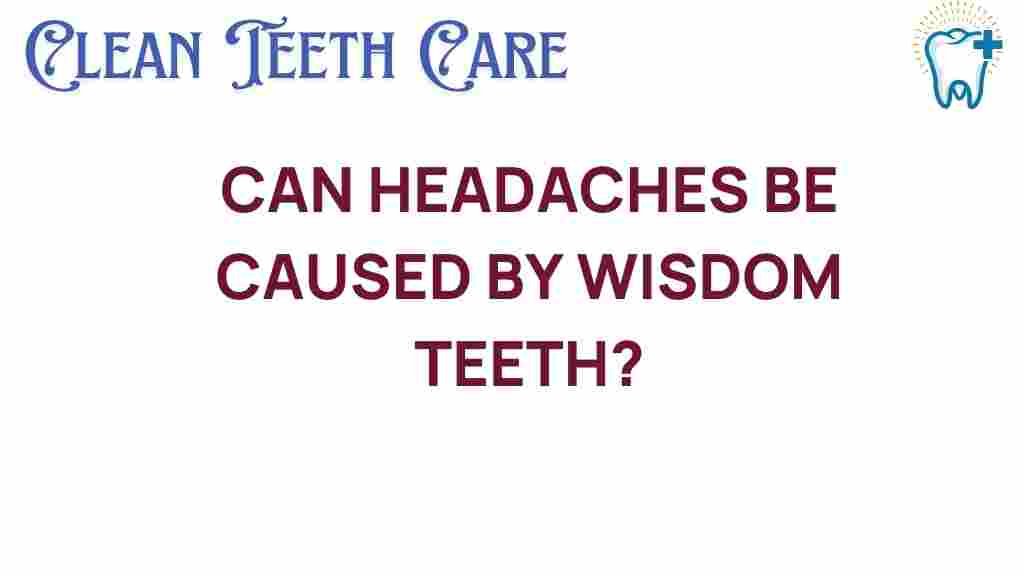Unraveling the Mystery: Can Headaches Stem from Wisdom Teeth?
Headaches can be debilitating, affecting your daily life, work productivity, and overall well-being. Many people seek to understand the various triggers of headaches, and one surprising culprit could be your wisdom teeth. This article explores the connection between headaches and wisdom teeth, delving into how dental health impacts oral pain, jaw issues, and even migraine triggers.
Understanding Wisdom Teeth
Wisdom teeth, also known as third molars, typically emerge in late adolescence or early adulthood, usually between the ages of 17 and 25. While some individuals experience no issues with their wisdom teeth, others may face complications such as:
- Impaction: Wisdom teeth can become trapped in the jawbone or gums, leading to pain and swelling.
- Infection: Partially erupted wisdom teeth can create pockets for bacteria to thrive, causing infections.
- Crowding: As they emerge, wisdom teeth can push against adjacent teeth, causing misalignment.
These complications can contribute to oral pain and may even lead to headaches in some individuals.
The Link Between Wisdom Teeth and Headaches
Many patients report experiencing headaches that coincide with dental issues, particularly those related to wisdom teeth. Here’s how the connection may work:
- Jaw Issues: Misaligned or impacted wisdom teeth can lead to jaw problems, including TMJ disorders, which are known to cause facial pain and headaches.
- Referred Pain: Pain from wisdom teeth can radiate to other areas, leading to headaches. The nerves in your jaw are interconnected with those in your head.
- Muscle Tension: Oral pain can cause you to clench your jaw or grind your teeth, leading to muscle tension and tension headaches.
Understanding these connections can help in diagnosing the cause of your headaches, especially if they seem to correlate with wisdom teeth problems.
Identifying Symptoms
Recognizing the symptoms associated with wisdom teeth can help determine if they are the cause of your headaches. Common symptoms include:
- Pain or discomfort in the back of the mouth.
- Swelling or redness in the gums.
- Difficulty opening the mouth.
- Headaches or migraines that seem to arise after dental discomfort.
- Jaw stiffness or pain.
If you are experiencing these symptoms alongside frequent headaches, it may be time to consult with a dental professional.
Step-by-Step Process: Diagnosis and Treatment
If you suspect that your headaches are linked to your wisdom teeth, follow these steps to address the issue:
1. Schedule a Dental Appointment
The first step is to consult with a dentist. They will perform an examination and may take X-rays to assess the position of your wisdom teeth.
2. Discuss Your Symptoms
Be sure to inform your dentist about your headaches and any other symptoms you are experiencing. This information is crucial for an accurate diagnosis.
3. Treatment Options
Depending on the diagnosis, your dentist may recommend:
- Monitoring: If your wisdom teeth are not causing issues, they may recommend keeping an eye on them.
- Medication: Pain relievers can help manage oral pain and headaches.
- Tooth Extraction: If the wisdom teeth are impacted or problematic, the dentist may suggest extraction.
4. Post-Extraction Care
After tooth extraction, follow your dentist’s care instructions to minimize pain and promote healing. This may include:
- Applying ice packs to reduce swelling.
- Taking prescribed pain medications.
- Eating soft foods to avoid aggravating the extraction site.
Troubleshooting Tips for Headaches and Oral Pain
While waiting for your dental appointment or recovering from extraction, here are some tips to manage headaches and oral pain:
- Stay Hydrated: Dehydration can trigger headaches, so drink plenty of water.
- Practice Relaxation Techniques: Stress can contribute to tension headaches, so consider yoga or meditation.
- Heat or Cold Therapy: Use a warm compress on your jaw or a cold pack on your forehead to alleviate pain.
- Over-the-Counter Pain Relief: Non-prescription medications like ibuprofen can help manage pain.
These strategies can provide temporary relief while addressing the root cause of your headaches.
Preventing Future Dental Issues
Maintaining good dental health is essential for preventing issues related to wisdom teeth and headaches. Here are some tips for effective dental care:
- Regular Dental Checkups: Schedule routine visits to your dentist for examinations and cleanings.
- Good Oral Hygiene: Brush and floss regularly to prevent tooth decay and gum disease.
- Healthy Diet: Eat a balanced diet rich in vitamins and minerals to support oral health.
- Avoid Tobacco: Smoking can impair healing and contribute to dental problems.
Conclusion
In summary, headaches can indeed stem from wisdom teeth issues, impacting your dental health and overall quality of life. Understanding the connection between oral pain, jaw issues, and migraines is crucial for effective treatment. If you suspect your headaches are related to your wisdom teeth, consult a dental professional for a thorough examination and tailored advice.
For more information on dental health and tips for maintaining a pain-free mouth, visit this resource. Remember, regular dental care can help prevent headaches and ensure your oral health remains in top shape.
By staying informed and taking proactive steps, you can minimize the risk of headaches associated with wisdom teeth and enjoy a healthier, pain-free life.
This article is in the category Conditions and created by CleanTeethCare Team
